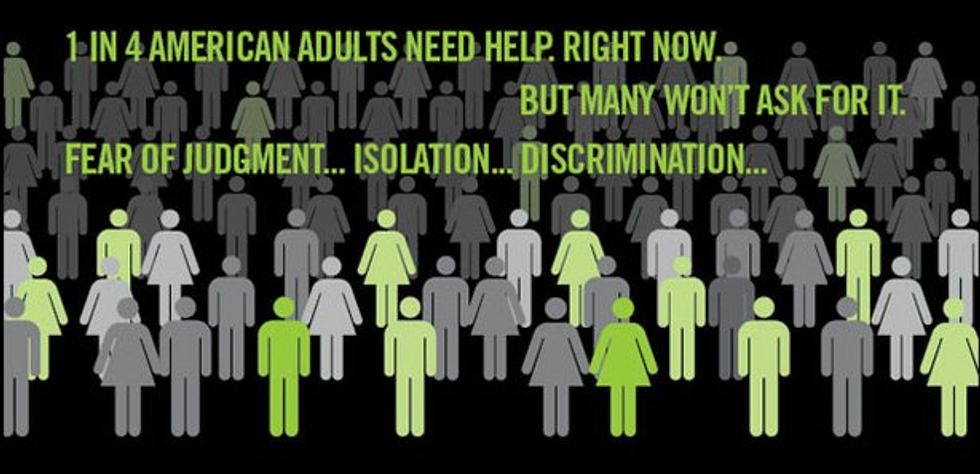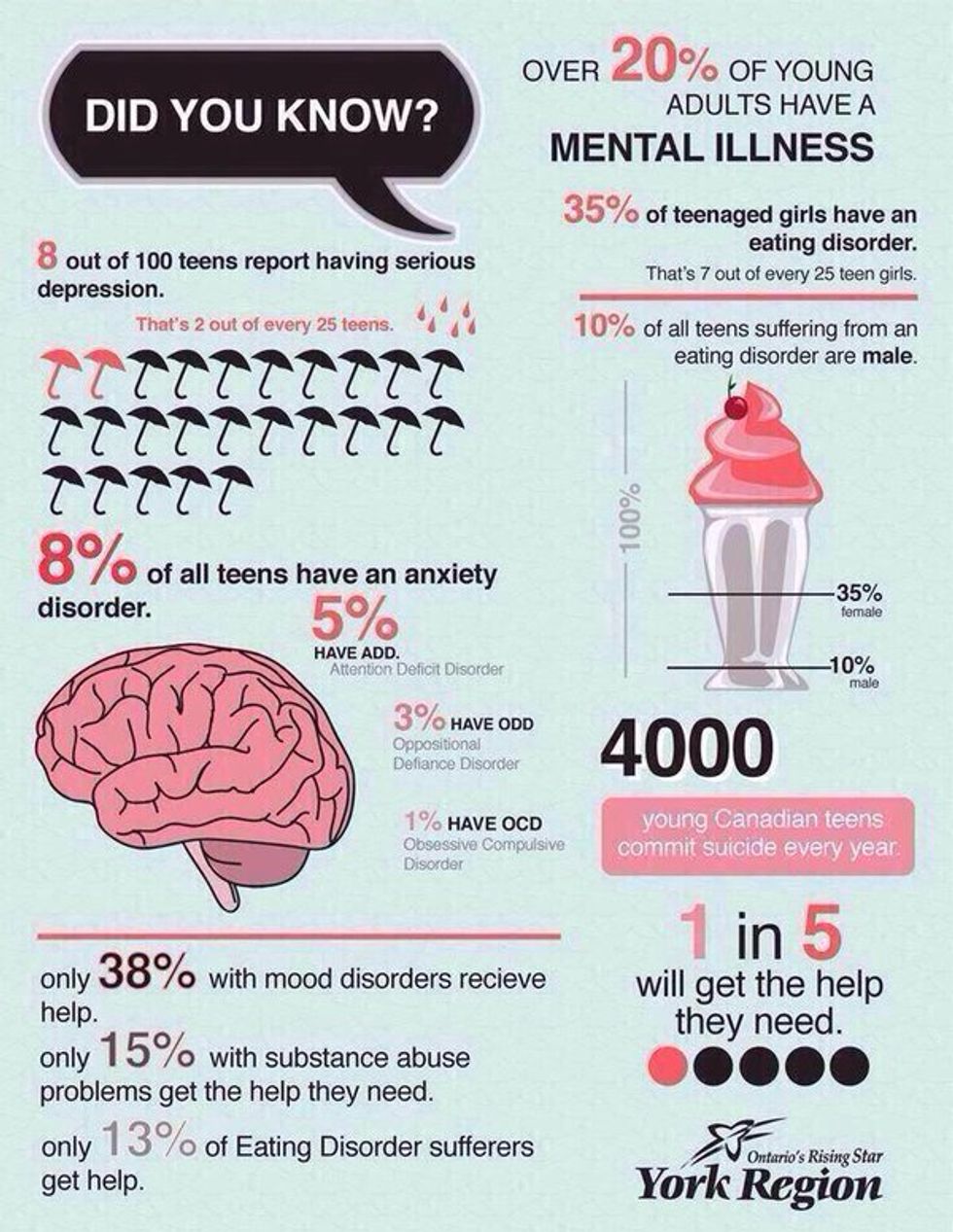Society has built structures around what is perceived as normal and what is not. These structures are what shape our perception of many things such as appearance, social status, wealth status, and mental health. According to American society, as well as many other countries in the world, to be mentally healthy is to be normal. It is never imagined that people with a mental illness are normal, because they are the exception to the rule, the outlier to the equation, and this, in the eyes of the people, make them abnormal. Mentally ill people are more likely to be disenfranchised because of their disability and therefore find it harder to get work, housing, and fitting into society. This leads to social isolation and detrimental perceptions of their illness and in order to prevent this, people must be educated on mental disorders.
A part of the problem that has perpetuated the mental illness stereotype is that some people believe that they themselves have certain mental disabilities, and often people remark, “I’m so OCD about cleaning my room.” However, most people who think this don’t actually have Obsessive Compulsive Disorder, but a mere quirk. Webster's Dictionary states that quirk is a peculiarity in behaviour that does not interfere with day-to-day function, while mental illness differs from quirks in that it does hinder day-to-day activities in life and make it difficult to function on a daily basis.
Because there is a full scale of disorders that exist, with many of them hard to fully understand, there is a certain stigma towards people with mental disabilities. A social stigma, as defined by DeLanardo and Terrion is when a group of people judges someone who differs from to the rest of society in the idea that they are a threat to the groups overall functionality. Researchers Bink, Fokuo & Schmidt described the social stigma of mental illness as the difference between “us” and “them". The “us” and “them” mentality means to isolate a certain group, weather it is on purpose or not. With these skewed ideals of mental illness along with stigmatizing them, it makes it extremely difficult for those who suffer mental illness to fit into a functioning society.
“Many social scientists have described stigma as prejudice and discrimination; stereotypic beliefs that lead power groups – employers, landlords, and healthcare providers – to restrict opportunities of people labeled with mental illness.” -Bink, Fokuo, & Schmidt
When a quirk is confused or confounded with a mental disorder, people begin to muddle the truth on what mental illness is. By using the example above, if someone believed that they had OCD, but could still function in society, and thinking that the disorder wasn’t as big of a problem. Therefore, they begin to gather the notion that perhaps the disorder is not real or not as serious as people make it out to be. This idea that mental illness is not considered a real illness also comes from the notion that because one cannot see the disorder, it is not a large problem.
With physical disabilities, it is much easier for people to understand what kinds of struggles the person is going through. But with mental illness, it becomes more difficult to pinpoint the illness outright. So, people perceive that the illness is not real or not that severe and conclude that the person can get rid of it on their own. Members of the Illinois Institute of Technology in the Department of Psychology explain that attribution theory, the ideals of placing attributes on people based on certain characteristics, have caused two different types of discrimination against the mentally ill. They describe
“the first as being beliefs that people are responsible for their mental illness lead to anger and an unwillingness to help. [The second being] beliefs that people with mental illness are dangerous lead to fear, desire to stay apart from this group” -Bink, Fokuo, & Schmidt.
These two stigmas are essential in understanding why healthy people treat the mentally ill with such disrespect. This is then confounded with the problem facing those with mental illness as the way it is portrayed in the media. Many television shows and media use mental disorders as jokes or comic relief. OCD, Bipolar Disorder Disorder, and Anxiety are sometimes used as a punch-line or a funny disorder that make the character do “funny” things. This also greatly contributes to the idea that mental disorders are not real and do not hold that much weight, when they are treated like a joke or comic relief.
It does not accurately represent the day-to-day struggles that people with mental disorders go though, instead they make light of that suffering. Other times, violence from the mentally ill is perpetuated in the media. Sometimes, those who commit crimes are people with a mental disorder and they are portrayed as disturbed and should be ostracized from society.
“Some of the negative stereotypes associated with the group labelled ‘mentally ill’ include that individuals in this group are dangerous, incompetent, and/or have a weak character, are violent or criminal, or are simple-minded and childlike” -DeLenardo and Terrion, 2014, p. 44).
There is often a false correlation between criminals and the mentally ill. Movies and popular culture often stir up this stigma that all people with mental illness are “crazy” and cannot function in society.
“People with mental disorders are restricted in their legal rights, vilified in the media, subject to inequity in medical treatment, socially devalued, and met with low expectations of competency” -Boysen, Ebersole, Casner, and Coston.
While these perceptions are true across the board, there is also a variation depending on the mental illness. Along with this comes the perception that those who have the mental illness are responsible for it occurring.
Many people will conclude that a person with depression is making themselves depressed. Or often, when informing people that I have a generalized anxiety disorder, they simply tell me that I should calm down and not worry so much. These ideals of the mentally ill being responsible for their disorder is damaging for both the people who believe this and those who are mentally ill.
This being the case that some people think a mental disorder is not real, with the media stigmatizing the mentally ill, many people find it difficult to treat people with the same respect and understanding they would a mentally healthy person. When someone with a mental illness is told that it is not real or can be easily fixed, it begins to skew their notion of their disorder, until they themselves may believe that their illness is not real, and therefore will not get help for it.
“Even more detrimental than the stigmatizing attitudes of others are the effects of internalizing negative stigmatizing messages, or believing the negative perceptions of mental illness to be true of oneself” -DeLenardo and Terrion.
It becomes a damaging introspection based off the opinions of their peers and society. There is an inherent fear in many people that they will be stigmatized if they seek therapeutic help, and therefore they will refrain from getting help.
One way to stop this from happening is educating and making people aware of what a mental illness is and how it differs from a quirk. Education allows people to become more informed on the topic and more inclined to believe that a mental illness is real. Mental illness education should be taught as early as elementary school, teaching children early about mental disorders. This type of education should be included in biology classes and not just psychology classes. Education can demystify many of the common stereotypes surrounding mental disorders.
There are many way to destigmatize mental health and it is through perception. Those at the Illinois Institute of Technology explain that if people can think of those with mental illness’ as simply different from them, then it is easier to have sympathy for the person (Bink, Fokuo, & Schmidt). In order to begin to dismantle the stereotypes of the mentally ill, a dialogue needs to be established, creating a greater understanding of what mental illness is and ways to help those who suffer from it. With education and social communication, there can begin to be an understanding of mental illness.
Rights like these are not won overnight. It takes many years to overthrow a stigma and much persistence. But with education, agreements can be reached and rights can be obtained. While it is often difficult to defeat a stigma, especially when the mental health stigma is so case-to-case, it must be attempted. People with mental illnesses deserve the same respect given to mentally healthy people and this respect can be obtained through a greater understanding of mental illness as a whole, as well as switching the portrayal of the mentally ill in the news and on television. With these changes, the mentally ill can be seen as human beings, without the hostility that society so readily provides.
Works Noted:
Blakemore, C. (2012). Disability Rights California. Retrieved May 14, 2017, from http:// www.disabilityrightsca.org/
Boysen, G., Ebersole, A., Casner, R., & Coston, N. (2014). Gendered Mental Disorders: Masculine and Feminine Stereotypes About Mental Disorders and Their Relation to Stigma. Journal Of Social Psychology, 154(6), 546-565.
Corrigan, P. W., Bink, A. B., Fokuo, J. K., & Schmidt, A. (2015). The public stigma of mental illness means a difference between you and me. Psychiatry Research, 226186-191.
Jacob, J. D., & Skinner, E. (2015). Exposing the Expert Discourse in Psychiatry: A Critical Analysis of an Anti-Stigma/Mental Illness Awareness Campaign. Aporia, 7(1), 5-16.
Jeffe, D. (2017, January). Treatment Advocacy Center. Retrieved May 14, 2017, from http:// www.treatmentadvocacycenter.org/index.php
Kaplan, M. B. (Writer). (1996, December 9). "Our Father Whose Art Ain't Heaven" [Television series episode]. In Frasier. Los Angeles, California: NBC.
Kendra, M. S., Cattaneo, L. B., & Mohr, J. J. (2012). Teaching Abnormal Psychology to Improve Attitudes Toward Mental Illness and Help-seeking. Teaching Of Psychology, 39(1), 57-61.
M. (Ed.). (2017). Merriam-Webster Dictionary . Retrieved May 14, 2017, from https:// www.merriam-webster.com/






















